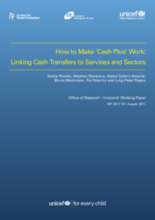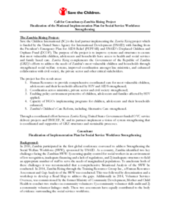Displaying 831 - 840 of 1617
Palladium is seeking a Team Leader for an upcoming programme to support capacity strengthening of communities and institutions to prevent and respond to Gender-Based Violence (GBV) and Violence Against Children (VAC) and provide better access to justice.
This blog post underlines the issues with orphanage volunteering and tourism, including its developmental and emotional impact on children and how it fuels the continuation of orphanages and diverts resources away from family preservation and reunification.
A new financing mechanism has been proposed in Uganda to provide financial support to Ugandan families living in poverty with children under age two, with the intention of supporting young children in families and keeping them out of institutional care.
This chapter of Child Maltreatment in Residential Care describes Interaction Competencies with Children – for Caregivers (ICC-C), a preventative intervention approach to improve the quality of care and reduce the incidence of maltreatment within institutional care settings in Sub-Saharan Africa.
This study investigated the incidence of maltreatment experienced by children living outside parental care, comparing the prevalence of abuse between children living with extended family, children living in institutional care, and children living or working on the street.
This paper aims to identify key factors for successful implementation of increasingly popular ‘cash plus’ programmes, based on (i) a review of the emerging evidence base of ‘cash plus’ interventions and (ii) an examination of three case studies, namely, Chile Solidario in Chile, IN-SCT in Ethiopia and LEAP in Ghana.
Catholic Relief Services (CRS)/4Children is recruiting for a Case Management Rapid Response (CMRR) Program Manager in Uganda.
CRS is recruiting for a 4Children Mozambique Program Manager (PM), who will provide overall project management and technical leadership to 4Children's project in Mozambique.
Save the Children is recruiting for a consultant to review and finalize Zambia's National Implementation Plan to strengthen the Social Service Workforce.
This study aimed to test the effectiveness of life skills education (LSE) and psychoeducation in the reduction of Youth Self Report (YSR) scores on institutionalized children in Kenya, using structured activities supported by trained facilitators.



